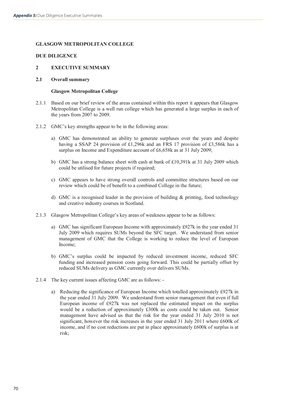
GLASGOW METROPOLITAN COLLEGE
DUE DILIGENCE
2 EXECUTIVE SUMMARY
2.1 Overall summary
Glasgow Metropolitan College
2.1.1 Based on our brief review of the areas contained within this report it appears that Glasgow
Metropolitan College is a well run college which has generated a large surplus in each of
the years from 2007 to 2009.
2.1.2 GMC's key strengths appear to be in the following areas:
a) GMC has demonstrated an ability to generate surpluses over the years and despite
having a SSAP 24 provision of £1,296k and an FRS 17 provision of £3,586k has a
surplus on Income and Expenditure account of £6,658k as at 31 July 2009;
b) GMC has a strong balance sheet with cash at bank of £10,391k at 31 July 2009 which
could be utilised for future projects if required;
c) GMC appears to have strong overall controls and committee structures based on our
review which could be of benefit to a combined College in the future;
d) GMC is a recognised leader in the provision of building & printing, food technology
and creative industry courses in Scotland.
2.1.3 Glasgow Metropolitan College's key areas of weakness appear to be as follows:
a) GMC has significant European Income with approximately £927k in the year ended 31
July 2009 which requires SUMs beyond the SFC target. We understand from senior
management of GMC that the College is working to reduce the level of European
Income;
b) GMC's surplus could be impacted by reduced investment income, reduced SFC
funding and increased pension costs going forward. This could be partially offset by
reduced SUMs delivery as GMC currently over delivers SUMs.
2.1.4 The key current issues affecting GMC are as follows: -
a) Reducing the significance of European Income which totalled approximately £927k in
the year ended 31 July 2009. We understand from senior management that even if full
European income of £927k was not replaced the estimated impact on the surplus
would be a reduction of approximately £300k as costs could be taken out. Senior
management have advised us that the risk for the year ended 31 July 2010 is not
significant, however the risk increases in the year ended 31 July 2011 where £600k of
income, and if no cost reductions are put in place approximately £600k of surplus is at
risk;
Appendix 5: Due Diligence Executive Summaries
70